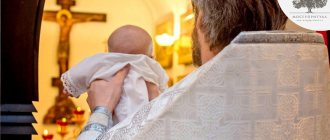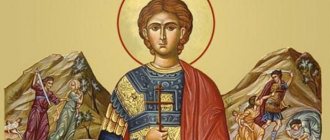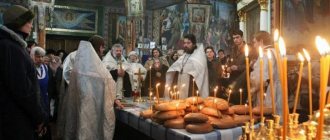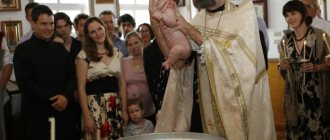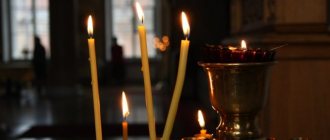There are all sorts of situations in life. Including when a person died who was not baptized. For example, this often happened in Soviet times. The ancestors (grandmothers and mothers) were Orthodox Christians and baptized, and the children appeared in the USSR when religion was eradicated and condemned. Many were afraid to go to church or call a priest to their home. After all, in this way one could lose one’s job and party membership.
There were other cases of people who died without baptism. Let's talk about this further.
In what cases do they pray for the unbaptized dead?
To calm the nerves of relatives, the church allows loved ones to pray for a person who died outside Christianity only at home.
What categories of citizens fall into the category of those who died without baptism?
- stillborn;
- children who died immediately after birth;
- aborted children;
- unbaptized people who never came to faith;
- people who stopped believing and going to church;
- suicides (death due to the influence of psychotropic drugs during treatment of a mental illness)
What do priests think about prayers for unbaptized relatives?
The Church rejects those who have not come to God through baptism. Therefore, funeral services are not held in church or at home for the unbaptized. If relatives hide this fact and the priest conducts a funeral service for an unbaptized person, he may be removed from ministry.
However, for infants who died unbaptized, a special rite was invented and synodally approved for commemorating such people in the church. Since, unlike the deliberately unbaptized, the children are not guilty of anything (they did not have time to sin), they are treated more gently, although they do not have a full funeral service.
When to pray for the unbaptized dead
Cultists recommend praying for such people at home on memorial days after the death of a person: three, nine, forty, and 365 days. It is especially useful for the soul of the deceased to pray during the first forty days, while it is near its native land and says goodbye to life.
In addition to the days associated with the moment of death, there is a time for remembering the deceased. And there are holy intercessors for the souls of the unbaptized.
To commemorate all the dead, including the unbaptized, specially designated days are used: Meat Saturday after Maslenitsa; Saturdays during Lent - 2nd, 3rd, 4th; after Easter, on the 9th day, on Radonitsa; on a memorable day in honor of Dmitry Solunsky, before November 8, Saturday.
How to properly bury a loved one?
At the cemetery, before closing the coffin, relatives must sprinkle the covered body with earth in a cross shape and cover it with a lid). If the funeral service takes place with the coffin closed, they kiss the cross on the lid of the coffin. The closed coffin, with the singing of the Trisagion, is taken out of the temple facing the exit (feet first).
Interesting materials:
Where is Yulik from? Where did roses come to us from? Where is Litvin from? Where are the seas on the Moon from? Where does human history begin? Where to start cleaning windows signs? Where does the name Hellas come from? Where can't you find a synonym? Where do destiny cookies come from? Where did astrology come from?
Which saints to pray for an unbaptized relative
The most famous intercessor for the souls of the unbaptized is Saint Uar, who lived in the 3rd-4th century. He served in the Roman imperial army, successfully commanding a large unit of warriors.
Once he secretly converted to Christianity at a time when there was active persecution for the faith. Then he sneaked over to the prisoners who were being tortured and forced to renounce their religion (they were religious teachers), and prayed for them. And then one of the preachers died from torture, and Uar decided that it was his time to suffer for his faith. Then the emperor found out about his faith in Christ, and imprisoned him in prison for torture. Uar did not renounce his faith and died.
The wife of one military leader took his body away and buried him in her family tomb. Uar's grave became a healing place. Her relatives (the woman's name was Cleopatra) were unbaptized and in a revelation the woman asked him to pray for the souls of her ancestors before God. Since then, Uar became intercessors. They pray to him outside the church for souls who did not undergo baptism in Christianity during their lifetime.
Hegumen Silouan (Tumanov)
..."How they decided everything for the Lord God!” — one of my acquaintances, a gray-haired archpriest with “experience,” spoke about some modern “zealots of piety.” “After all, who will be saved and who will not - after all, God alone knows! And what kind of self-confidence do they have?!! Catholics and Armenians will not be saved by them, Muslims will not be saved. Unbaptized children go straight to hell, as if they had the opportunity to repent! Everyone has been condemned, and they think that they alone will be saved and that they alone want to sit in a heavenly meadow. They don’t even need the Last Judgment! They distributed everyone themselves!”
And indeed! We all know that salvation is from sin, curse and death, i.e. The Kingdom of Heaven is promised by Christ only to members of His Holy Orthodox Church. But can we say with a clear conscience that we are worthy of heaven only because we call ourselves Orthodox Christians, and pious people of other faiths are, again, unworthy only by virtue of their name?
Yes, we are promised an inheritance of the Kingdom. But have we fulfilled the conditions for receiving this inheritance? Have we become worthy of it? It is unlikely that any Orthodox Christian with a clear conscience will answer this question positively, because the further a person moves along the path of virtues, the more he sees his own, and not others’, shortcomings.
However, some of us, mostly those who have recently come into the fold of the True Church, have already boldly “distributed” everyone who disagrees with us into different departments of hell, forgetting that it is not our concern to judge people. And it is not only by name that a person is saved, but by his way of life. “Not everyone who says to me, Lord, Lord! will enter the Kingdom of Heaven,” Christ warns us all (Matthew 7:21).
***
What is the fate of the unbaptized and those of other faiths after death? Behind this seemingly abstract question is not only idle curiosity and a natural desire to find out about the posthumous fate of non-believers or otherwise believing loved ones.
Questions of this kind are a touchstone for all of us Orthodox Christians. A test of humanity, of the ability to love not only “our own people,” but also those who think and believe differently. That is, to fulfill Christ’s commandment to love even towards enemies.
Does Orthodoxy turn us into “terminators”, seeing only conspiracies of world evil around us, incapable of loving other people, incapable of normal human feelings? Or can our saving faith transform us so much that our dissenting neighbors themselves will want to live the same way of life with us?
Fr. correctly noted. Alexander Ovcharenko: “If one person in an unbelieving family believes, he has only one way to bring the rest to faith: if he does not shun them and contrasts his “pure self” with the rest of the “sinners”” https://www.pravportal.ru/ index.htm?id=1533 .
The True Church and the “life of the next century”
Of course, for us, Orthodox Christians, it is obvious that Christ founded His true Church to give all people the opportunity to be saved.
Therefore, the Church’s belief that those who do not belong to Christ’s Church cannot inherit the Kingdom of Heaven is completely understandable.
But here, too, one must have sobriety and chastity, because it is one thing to believe that outside the Church there is no salvation for ME, and quite another to decide for the Lord God and deny salvation to EVERYONE else, even if they are non-believers or believe in God differently than the Orthodox .
What is the fate of these people? The answer is simple - we don't know. We only know that the righteous will be with Christ, and the sinners will be in hell. And it will be eternal bliss or eternal torment.
But, speaking about salvation or eternal destruction, we must admit that we know almost nothing about the “life of the next century,” but we are preparing for it as the Lord commanded us.
And the Lord in many parables set the condition for receiving the Kingdom of Heaven not as formal membership in one or another church organization, but as active virtue.
Don't believe me? Here are the words of Christ:
“When the Son of Man comes in His glory and all the holy angels with Him, then He will sit on the throne of His glory, and all nations will be gathered before Him; and will separate one from another, as a shepherd separates the sheep from the goats; and He will put the sheep on His right hand, and the goats on His left.
Then the King will say to those on His right hand: Come, you blessed of My Father, inherit the kingdom prepared for you from the foundation of the world: for I was hungry, and you gave Me food; I was thirsty and you gave Me something to drink; I was a stranger and you accepted Me; I was naked and you clothed Me; I was sick and you visited Me; I was in prison, and you came to Me.
Then the righteous will answer Him: Lord! when did we see you hungry and feed you? or to the thirsty and gave them something to drink? when did we see you as a stranger and accept you? or naked and clothed? When did we see You sick, or in prison, and came to You?
And the King will answer them, “Truly I say to you, just as you did it to one of the least of these brothers of Mine, you did it to Me.”
Then He will also say to those on the left side: Depart from Me, you cursed, into the everlasting fire prepared for the devil and his angels: for I was hungry, and you gave Me no food; I was thirsty, and you gave Me no drink; I was a stranger, and they did not accept Me; I was naked, and they did not clothe Me; sick and in prison, and they did not visit Me.
Then they too will answer Him: Lord! when did we see You hungry, or thirsty, or a stranger, or naked, or sick, or in prison, and did not serve You?
Then he will answer them, “Truly I say to you, just as you did not do it to one of the least of these, you did not do it to Me.” And these will go away into everlasting punishment, but the righteous into everlasting life.” (Matt. 25, 31 - 46).
It would seem that everything is simple: he came, believed, was baptized, and was saved. And then it turns out that something needs to be done!
Therefore, it is understandable why the Church does not approve of arbitrary fantasies on this topic. Fantasies are dangerous here because they concern a very important person in life. If you have the wrong idea about the afterlife, then you are preparing for it incorrectly. Consequently, there is a great risk of “getting to the wrong place” after death.
We can talk about the afterlife only based on the texts of the Gospel, and even then preferably in the interpretation of the Holy Fathers, “for the hearts of people have become hardened and their ears are hard to hear, and they have closed their eyes, lest they see with their eyes” (Matthew 13.15).
However, we can immediately say that the idea of paradise as a garden filled with sensual benefits, where the righteous, dressed in sheets, under the supervision of angels, eat large, organic apples for an entire eternity in pious boredom, is fundamentally contrary to Christian teaching. The goal of eternal life is communion with God. God is Spirit, and there can be no other joy in heaven except being with God, who is Love.
Therefore, we dare to assume that those who have alienated Divine love from themselves in earthly life have lost it forever. The Lord has given us the opportunity to avoid this terrible fate, and how we use it is our personal choice.
Christianity constantly tells us that man is abnormal, sick, and in need of transformation and healing. And he doesn’t just say, but proposes a way to solve this problem, which is impossible without our voluntary, personal consent. But when God through the Church reminds us of this, we resist and refer to our free will - they say, there is no point in dragging us by force to heaven. And when, having rejected this good, we lose it irrevocably and understand the full gravity of our situation, then often, instead of blaming ourselves and giving God the opportunity to save us, we again make claims to him - they say, why didn’t You, Lord, save us earlier? ?
This is the duplicitous deceit of our approach to spiritual and eternal life. On the one hand, we do not allow God and His servants to influence a person’s choice: to be a Christian or not, to observe moral and ethical standards and commandments, etc. But on the other hand, seeing the collapse of our lives, or hearing the testimony of Orthodox priests about the inevitability of eternal torment for those who rejected Christ, we are indignant: “What kind of God is this if so many people die? No, everyone goes to heaven!
In short, in any case, God is to blame, and we, whatever one may say, are fair and good! Need I clarify that such duplicity has never graced a person, even from a non-Christian point of view?
To get rid of such hypocrisy and duplicity, you must admit your imperfection. Understand that it is so deep that a person himself cannot correct it. Recognize that this imperfection needs correction and call on the Savior as the True Physician of souls and bodies for our healing.
Love as a sign of healing
One of the signs of a person’s correction (healing) will be an ever-increasing love for one’s neighbor and, naturally, sadness for the lost: “Love is a Divine gift that perfects human nature. Love for one's neighbor is a sign of acquiring true love for God. According to the words of Saint Isaac the Syrian, “the sign of those who have achieved perfection is this: (even) if they are handed over to be burned ten times a day for love for people, they are not satisfied with this” (V.N. Lossky “Dogmatic Theology”)
By the way, here you can already ask the question: are atheists and people of other faiths incapable of grieving for one of their friends and relatives, of sacrificing their lives for them?
The general Christian attitude to this issue can be expressed in the following quote: “I also know such a person,” says Saint Simeon the New Theologian, “who so strongly desired the salvation of his brothers that many times with hot tears he begged God that they too would be saved.” , or he, along with them, was given over to torment... For he was so united with them spiritually that he did not want to enter the Kingdom of Heaven, having separated from them” (V.N. Lossky “Dogmatic Theology”).
Can we take upon ourselves such courage, I would say, audacity, and answer for all people on earth that they are incapable of such feelings?
Therefore, it should be noted that the Church does not at all insist that all other people (i.e. non-Christians) will perish. We only know that salvation is promised to Orthodox Christians.
But when a person is drowning, it is unreasonable for him to grumble at the Boatman, who picked up not only him, but also someone else. God's providence for the salvation of unbelieving humanity is not our concern. Our job is to pray for forgiveness of our own sins.
***
Does all this mean that it is not necessary to belong to the Orthodox Church? Not at all. We are convinced from our own experience that Orthodoxy has all the conditions for our salvation, and that is why we chose our Church. Other faiths for us, who have Orthodox experience, will only be disastrous.
What are these conditions?
Saint Isaac the Syrian distinguishes three stages on the path to unity with God: repentance, purification and perfection, that is, a change of will, liberation from passions and the acquisition of perfect love.
If repentance is the beginning of this path, the “gate of grace,” this does not mean that it is just a stage that must be passed through. This is an ongoing and permanent state of those who truly strive for union with God, because the very word “repentance” (Greek metanoia) literally means “change of thoughts,” “change of mind.” (V.N. Lossky “Dogmatic Theology”).
And this is a process throughout a person’s life.
Repentance
So, the beginning of our unity with God is repentance! It is with repentance that Christianity begins in a person. Faith in a person does not begin with the formal act of baptism and entry into the Church, but with repentance.
Saint Ignatius Brianchaninov speaks about this very clearly: “The beginning of turning to Christ lies in the knowledge of one’s sinfulness, one’s fall; from such a view of himself, a person recognizes the need for a Redeemer and approaches Christ through humility, faith and repentance... He who does not know his sinfulness, his fall, his destruction cannot accept Christ, cannot believe in Christ, cannot be a Christian. What need does Christ have for someone who is both reasonable and virtuous, who is satisfied with himself, who recognizes himself as worthy of all earthly and heavenly rewards?”
It is not in the rational belief that Christ came, suffered and rose again, “the beginning of turning to Christ,” but, on the contrary, faith itself is born from the knowledge of “one’s sinfulness, one’s fall.” This statement contains the first and most important point of spiritual life. Obviously, according to the thought of St. Ignatius, in the Orthodox understanding, a believer is only one who sees his spiritual and moral imperfection, his sinfulness, suffers from it and seeks salvation from it, humbled before God.
From here, by the way, all the absurdity of an exclusively rational and ritualistic, legalistic faith, which grows complacency and pride in a person, becomes obvious.
As an argument, the Saint cites the history of the earthly life of the Lord Jesus, when Christ was received with tears of repentance by simple Jews, aware of their sins, and was condemned with hatred to a terrible execution by the “smart,” “virtuous,” respectable Jewish elite.
The thought of Saint Ignatius constantly turns to the words of the Gospel: “It is not the healthy who need a doctor, but the sick” (Matthew 9.12). That is, only those who are able to see the illness of their soul, its incurability on their own, take the path of healing and salvation. From this state of humility, they turn to the true Doctor who suffered for them - Christ.
Outside of this state, normal spiritual life is impossible. “The entire edifice of salvation is based on the knowledge and awareness of weakness,” writes Bishop Ignatius. He repeatedly quotes the remarkable words of St. Peter of Damascus: “The beginning of the enlightenment of the soul and the sign of its health lies in the fact that the mind begins to contemplate its sins, which in their multitude are similar to the sand of the sea.”
Therefore, the Saint repeats again and again: “Humility and the repentance born from it are the only condition under which Christ is accepted! Humility and repentance are the only price that buys the knowledge of Christ! Humility and repentance are the only moral states from which one can approach Christ and become assimilated to Him! Humility and repentance are the only sacrifice that God seeks and accepts from fallen humanity (Ps. 50:18,19).
“Those infected with a proud, erroneous opinion about themselves, who recognize repentance as unnecessary for themselves, who exclude themselves from the ranks of sinners, are rejected by the Lord. They cannot be Christians.” (Prof. A.I. Osipov “To help those who are being saved”).
Testimonies of the Fathers
Now it’s worth thinking about whether it is possible to realize one’s sin, i.e. repentance among unchurched people, and even more so among those who did not even know about the existence of the historical Church and did not hear the preaching of the Gospel?
Maybe we are being liberal and trying to replace the faith of the entire Church with our fantasies?
But no! and in Scripture and in the Holy Fathers we do not find such an unconditional statement.
Already in Acts there is such a statement: “in every nation he who fears Him and does what is right is acceptable to God” (Acts 10:35). In 1 Timothy chapter 4, verse 10, the Apostle Paul writes: “For this is why we labor and endure reproach, because we trust in the living God, who is the Savior of all men, and especially of those who believe.”
Rev. Maximus the Confessor wrote that the Holy Spirit “providentially penetrates into everyone, as far as possible, awakens in everyone the natural mind, through which it brings to consciousness the sinfulness of what has been done contrary to the law of nature, who is able to feel it and has a sound will to perceive correct natural thoughts. And in fact, even among the extremely rude barbarians and nomads, we find many who have acquired high moral nobility and rejected the brutal laws that have prevailed among them since ancient times.”
Irenaeus of Lyons testifies: “Christ came not only for the sake of those who believed in him, but for all people in general who wanted to see Christ and hear his voice.”
When St. died Paphnutius, he said: “It is not so much this or that kind of life that is pleasing to God, but purity and disposition of the heart.”
The historian Rufinus conveys the following story about this saint: “Having reached the heights of angelic life, he once asked God to show him with whom he was equal among those who pleased Him. And the Angel of the Lord appeared to him. “You are like one buffoon who plies his trade in a neighboring village with his art.”
Elder Nectarius of Optina also famously said: “A simple Hindu who believes in the Almighty and carries out His will as best he can will be saved, but the one who knows about Christianity and follows the Hindu mystical path will not.”
At a meeting with students of Moscow Theological schools, Metropolitan Anthony of Sourozh was asked the question: “Is salvation possible outside of Christ?” He answered: “I would say yes; Take the words of the Apostle Paul that the pagans are guided by the law of God, Christians follow the law of Christ (Rom. 2:14).
Question: “But they must come to Christ?”
Answer: “They may not be suitable, because this is a historical opportunity. You cannot question a person's eternal salvation simply because he was born in Central Africa in an era when there were no missionaries there; then salvation would really be determined by geography and history, then it would simply be God’s will: you were born there, and therefore you are condemned. There is nothing moral here, there is only either an accident or the evil will of God.”
Bishop Anthony further says that among people there are many who have reached such a degree of knowledge of God that only the name “Jesus” is missing to give the key and explanation to everything.
“Can you imagine,” asks Bishop Anthony, “that when such a person appears before the face of the Lord after death, he will not know: “This is Whom I have been looking for all my life, this is the answer to all my perplexities”? Thus, we are no longer talking about salvation outside of Christ, but rather about the salvation in Christ of those who, for one reason or another, died outside the Christian faith.” (Antony (Bloom), Metropolitan of Sourozh. On some categories of our created existence: Church and time, 1991, N2)
So we cannot categorically state that all those who did not belong to the earthly, historical Church will perish!
We can only talk about each specific person, about his degree of virtue, his desire for truth! But for this you need to know what was going on in a person’s soul in the last minutes of life! And this is only possible for God, so we again return to the beginning of the conversation.
Children who died unbaptized
Separately, we need to consider the issue of dead children, especially victims of abortion.
Many different opinions have been expressed on this matter, but for me the main thing remains the impossibility of repentance. If God expects us to make a voluntary choice between Himself and the devil, then what kind of choice are we talking about for unborn children?
Mothers - yes. They suffer terrible punishment as murderers. How did the children reject God’s goodness?
There is a well-known opinion of Saint Gregory the Theologian that children who die without baptism will neither be in glory, nor in torment, nor in bliss, nor in punishment. They will be deprived of the sight of God, but they will receive some consolation from God. Their salvation will be salvation from the fire of Gehenna, but not transfiguration and sanctification by grace.
But this is only his personal opinion, not confirmed by Holy Scripture.
The Church is “the pillar and foundation of the truth”; she cannot create illusions and tell lies instead of the truth. Can a person without the sacrament of baptism be a partaker of eternal life, as eternal communion with God?
Don't be so quick to give a negative answer. Remember the prudent thief, who was not baptized, who did not fast, who did not receive communion, but who entered the Kingdom of Heaven.
It is clear that this is an exception, and normal church life cannot be built on exceptions. But this means that if a person’s will does not oppose God, salvation is possible even without formal compliance with the norms of church life.
These exceptions do not apply to us, healthy adults with the right to choose. We heard the sermon, made vows, and have the opportunity to freely observe church regulations. There is no excuse for our sins, our unchurchedness. But those who did not even have the opportunity to repent on Earth can enter the Kingdom of God in another way.
And there is no need to fear that the teaching that infants who die without baptism are saved makes the baptism of children under conscious age unnecessary. All people, including children, need to cleanse their human beings from the consequences of original sin. And it is the duty of Christian parents to do this through the sacrament of Baptism.
“The fate of infants who died unbaptized cannot in any case be called hopeless.” This is what the monk of the Holy Dormition Pskovo-Pechersky Monastery, Ippolit, said at the beginning of the twentieth century. “St. Apostle Paul speaks of those children whose father is a Christian and whose mother is unbaptized, that these children are “saints” (1 Cor. 7:14). Our stillborn babies have Orthodox parents and ancestors. In addition, these children, in some way, were already sanctified during the womb of their mothers: while carrying them in their wombs, their mothers prayed every day, often read or listened to the Word of God and united with Christ the Lord in the sacrament of Holy Communion. And when the time came for their mothers to be resolved by them, they with warm faith resorted to God’s help and, perhaps, made a special vow before God so that their resolution would be successful. How can one think that children, the fruit of such parents, will perish forever? Even if one of them dies in the womb; and then there was the readiness of the parents to perform baptism on him. And our very intentions are pleasing to the Lord God if they are holy...”
Yes, original sin, as an active, destructive force, is like an epidemic that struck all of humanity. Because of the genetic unity of the human race, everyone, even unborn babies, is susceptible to this epidemic of sin. But everyone must voluntarily ask God for healing themselves, or through recipients, and babies who die in the womb are simply unable to do this, as well as receive baptism in any way.
Of course, the sacraments received by the mother do not exclude the need for the child to receive them later. But in the single organism of mother and child, can it be said that the Holy Mysteries sanctified and transformed only the mother, without touching the baby?
Of course, the intention itself is a good disposition of the soul, and can be rewarded, but it never replaces action - St. Gregory the Theologian writes about this in his sermon “On the Feast of Epiphany.” And the sacrament where the Holy Spirit acts cannot be equalized or replaced by human intention.
But this is a warning to mothers who refuse to baptize their children or even kill them in the womb. It is no longer people who care about dead children, but God Himself.
One of the opponents of the opinion about the salvation of unborn children has an absurd point of view, according to which “a woman who decides to have an abortion sends the soul of her mortified child directly to heaven, therefore, does him the greatest mercy. Not all Christians will be saved, but abortion is one hundred percent salvation, which means the abortionist is the mother of saints, and the abortion clinic is the place where angels go to take the souls of babies. In general, the knife and tongs of an executioner in a white coat can do more in a few minutes to save a soul than prolonged labor over decades, where the end is still unknown.”
It is unlikely that the author of this idea is able to point to at least one woman who had an abortion for these reasons, i.e. wishing holiness for your child.
I’m already silent about the fact that a person (i.e., a mother) with such intentions is obviously insane and deserves appropriate treatment. Again, “long labor for decades” is simply impossible for an already deceased baby, and a murderous mother does not escape eternal condemnation and God’s punishment by saving her child.
So the opinion that unborn children can enter the Kingdom of God even without Baptism cannot serve as a justification for abortion.
On prayer for deceased non-Christians
Now another question. Do we have the right to pray for the repose of non-believers, unbaptized or heterodox?
The answer is also simple. We do not have the right to pray in the Church for those who voluntarily refused to remain in It. Church prayer is prayer for the members of the Church. If a person dies who did not want to receive St. Baptism and funeral services for such a person are not performed. And this is not cruelty or callousness of the Orthodox, for the Church is based on love for God and people.
You cannot force people to be Christians against their will, this is contrary to the teachings of God and will be violence against the free will of such people. The Lord Himself, being omnipotent, does not force the will of man, but awaits its free will in addressing him. Only with a harmonious combination of the will of God and the will of man does the salvation of the human soul occur.
The power of the priest and the power of his prayer are great in the Church (Matthew 16:19), but not unlimited. The priest has no right or strength to intrude into an area that entirely belongs to the omniscience of God. Therefore, the posthumous fate of the deceased unbaptized should be left to the mercy of God. The Lord, a righteous and impartial Judge, will judge everyone according to his life.
Here the Church follows the principle clearly stated by Metropolitan Philaret (Drozdov) of Moscow that the non-Orthodox by their very non-Orthodoxy have separated themselves from the sacraments of the Orthodox Church and this corresponds to their disobedience in the Sacrament of the Eucharist.
Consequently, at the Divine Liturgy the Church does not commemorate the non-Orthodox and especially the deceased who can no longer join her. But we can pray for unbelievers and people of other faiths at home, in our cells, fulfilling our duty of Christian love.
***
Hieromonk Joseph, Head of the Optina Skete, answered the question “Is it possible and how can Orthodox Christians pray for non-Orthodox Christians?” So. “When we talk about the strictness of our Orthodox Church regarding the commemoration of non-believing Christians, we do not mean that our holy Church commands us, her children, not to pray for them in any way. It only forbids us to pray on our own, that is, to pray as we want and as we please. Our Mother the Orthodox Church instills in us that everything we do, like prayer itself, should be done in order and in a good manner (1 Cor. 14:40). We pray, during all our church services, for all peoples of different tribes and for the whole world, most often without knowing or understanding it ourselves.
It is we who pray as our Lord Jesus Christ taught his apostles to pray in the prayer devoted to them: “THY WILL BE DONE, AS IN HEAVEN AND ON EARTH!” This all-encompassing petition embraces all the needs of our brothers and those of our fellow believers, even if they are not believers. Here we ask the All-Good Lord for the souls of deceased non-Orthodox Christians, so that He would do with them what is pleasing to God and His holy will. For the Lord knows immeasurably better than us who to show what kind of mercy. - So, Orthodox Christian! - whoever you are: a layman or a priest of God, if during any church service the zeal comes to you to pray for someone close to you, Karl or Edward: then while reading or singing the Lord’s Prayer, sigh for him to the Lord and say : THY HOLY WILL BE DONE ABOUT HIM, LORD! - and limit yourself to this prayer. For this is how you were taught to pray by the Lord Himself. And believe that such a prayer of yours will be a thousand times more pleasing to the Lord and more beneficial for your soul than all your unauthorized church commemorations.”
There is a well-known example in the Orthodox Church that the private prayer of one Pleasant of God helped the souls of deceased Gentiles, even pagans. In "Fatherland" Bishop. Ignatius we read: “Once Abba Macarius, walking through the desert, found a human skull lying on the ground. When Abba touched the palm stick he had in his hand to the skull, the skull gave out a voice. The elder said to him: who are you? The skull answered: I was the priest of the idolaters who lived in this place, and you are Abba Macarius, who has within you the Holy Spirit of God, when, having mercy on those who are in eternal torment, you pray for them, they receive some consolation. Next, the skull, telling St. Macarius about hellish torment, ended like this: “We, who do not know God, are shown at least some mercy; but those who knew God and denied Him and did not do His will are below us” (“Fatherland”, 4th ed., pp. 311-312).
From this story of the blessed Father, first of all, we see that his prayer for the suffering was not church-public, but private. This prayer can partly serve as a reason for us, Orthodox Christians, to pray for living and dead non-believers with private prayer at home.
But can we even wish salvation for non-Orthodox people?
We have already said that nowhere in the Gospel does it speak of paradise as a sensual garden. The Lord Jesus Christ speaks about paradise allegorically, in parables, avoiding direct formulations, knowing that a person, living in the world, will not be able to understand the meaning of the unearthly, supernatural reality. The Apostle Paul writes that “eye has not seen, ear has not heard, and the things that God has prepared for those who love Him have not entered into the heart of man” (1 Cor. 2:9). Therefore, it is not worth describing the feelings that a person will experience in the Kingdom of Heaven.
It is known that angels and saints living in paradise can pray to God for the salvation of people. “In My Father’s house are many mansions” (John 14:2), said Christ, from which we can conclude that heaven is a place where everyone will find exactly what he expects for his consolation, as well as and in order to pray to God for the salvation of their lost relatives and friends.
We have learned to convince ourselves that death is not serious, it’s a make-believe thing, and if it does happen, it doesn’t happen to me. It is easy to notice that in modern secular culture, death is carefully expelled from consciousness and is replaced by cinematic and computer props. Of course, when tragic events occur in our lives, every person, regardless of religious beliefs, is faced with this terrible reality.
However, both from the literature and from our own experience, we see that believers cope with their experiences much easier. And not because, as Marxists once taught, faith supposedly has a “pain-relieving” effect, and certainly not because of some special spiritual callousness of Christians. It’s just that a believer is better prepared; in comparison, an atheist is like a new recruit who has come under fire for the first time. A Christian, unlike him, knows who the battle is with, knows whose soldier he is and what must be done to survive and win.
Is it scary to save yourself and not see your loved ones saved? What we all face in the end is truly scary. If, of course, you think about it seriously. And, having thought seriously, it is worth asking yourself: do I really consider myself already in the Kingdom of Heaven, while I deny others the opportunity to believe and be saved? If this is so, then my affairs are bad, and I am as far from the Kingdom of God as the Pharisee from the Gospel parable (Luke 18.11). After all, the Lord gave the opportunity for repentance to everyone - both the bribe-taking publican, despised by everyone (Luke 18.13), and the thief crucified next to Him (Luke 23.42).
If I deprive someone of this opportunity, in my pride I commit a crime against God that will close the path to salvation for me.
***
And after all this reasoning, I accidentally come across on the website of one schismatic who accused all others of falling away from the Truth, the following hysterical lines:
“At present, almost none of the people who consider themselves Orthodox and churchgoers undergo aerial ordeals! Millions of people are going to the prisons of hell before the Last Judgment! Everyone, even those who are well-intentioned and want to please the Lord, are in terrible self-delusion and complete spiritual blindness. The living practical teaching of Christ has been perverted beyond recognition! The truth is mistaken for falsehood, and falsehood for the truth! Workers of repentance are not visible at all! The clergy and pseudo-elders are in demonic delusion and do not stand in the truth! How can they lead others out of delusion or teach them repentance and prayer, which they have no idea about? There are no true teachers and preachers! Prayer is effective when neglected! There is no repentance, and they don’t know how to truly repent! There is no boldness towards God! They don’t see or feel sins, or even charge them with nothing at all. The spirit is extinguished! The lights have gone out!
God has become incomprehensible and inaccessible to people! In turn, as the great elder Theodosius of Jerusalem said, people have become not dear to God! People are just playing at salvation and churchliness!” ...
***
No, heretics, schismatics and “zealots beyond reason” are wrong. God is both understandable and accessible to everyone; this is the meaning of His incarnation and the founding of His Church. There is also boldness towards salvation, there are also lamps.
The Church does not play, but saves. This secret is simply revealed to people with a pure heart. It is revealed to those who, in the simplicity of their mind, care about how to please God, care about eradicating their sins, and not about looking for sins in other people.
We are still dear to God. The Kingdom has been offered to us. So let us pass the test of love and not exchange royal dignity for a stew of imaginary personal righteousness.
